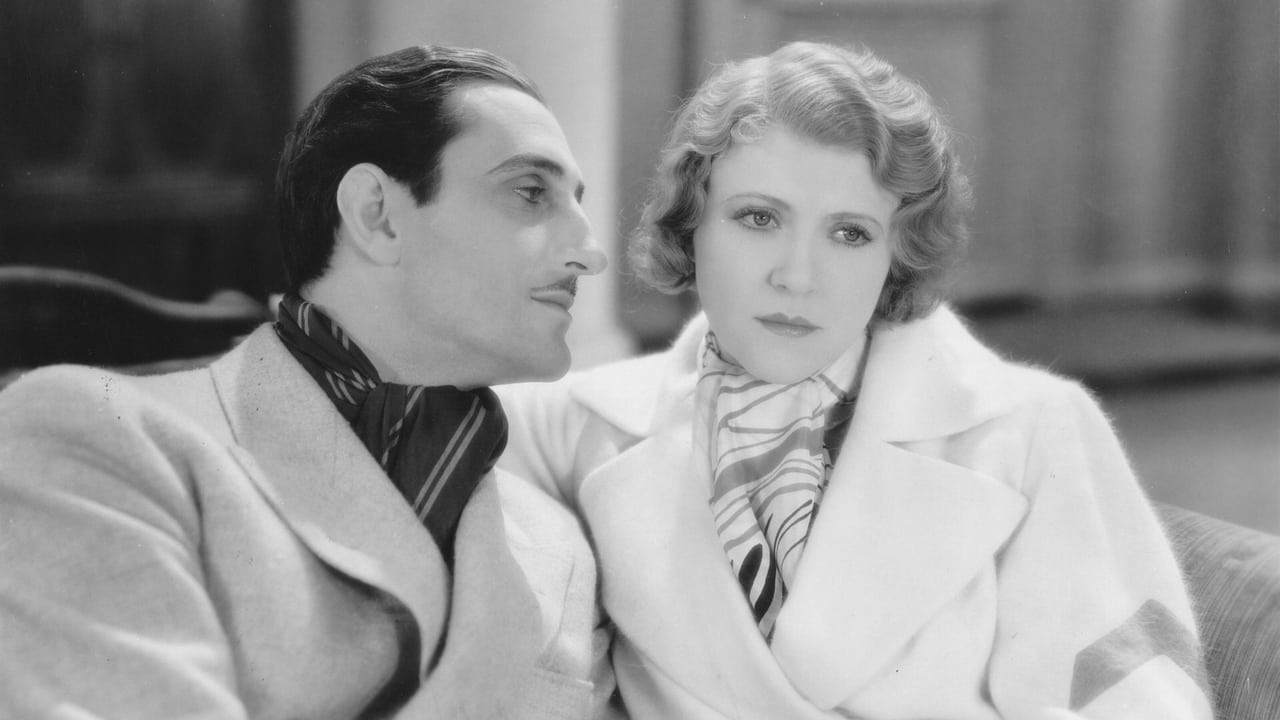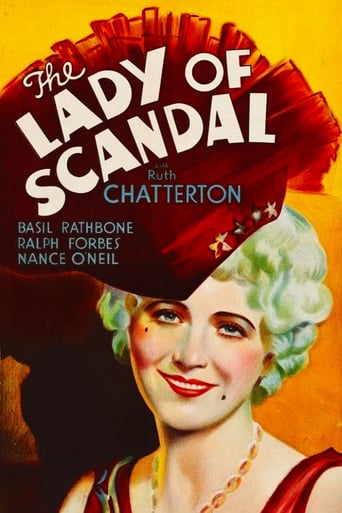

Dull, primitive early talkie from a Frederick Lonsdale stage success. The camera's nailed to the floor, the sound's iffy, and the performances and attitudes aren't just from another era, they're from another planet. Ruth Chatterton, never saying "terribly" when "teddibly" will do, is the stage actress (she does a musical scene, and if that's not her voice, it's a good double) who's looked down on by the family of the Brit gentleman (Ralph Forbes, boring) who wants to marry her. So she conveniently falls in love with his pal Basil Rathbone, also uninteresting, and the matter gets sorted out in clipped accents. Ruth's supposed to be self-sacrificing and appealing but she's haughty and supercilious, and the pacing's glacial. You don't care about these upper-class twits, and it's a relief when it's all ironed out. Marginally compelling as an example of movies learning to talk, but it's really, really stagebound, and director Sidney Franklin lingers over every stilted word as if it were Scripture.
... View MoreThe Lady of Scandal (1930)** (out of 4) This early talkie features Ruth Chatterton playing Elsie Hilary, a British actress who is engaged to a man from a snobbish rich family. Everyone in the family objects to her "nature" except for Edward (Basil Rathbone) who finds himself falling for her. THE LADY OF SCANDAL remains somewhat watchable due to its fun leads but the sad reality is that this is just another early talkie with way too much talking. You know, I truly understand that in the early days of sound people wanted to hear people talk. I do wonder what they truly felt about these movies back then but when you view them today you pretty much just shake your head because of all the dialogue. I mean, to simply tell someone who want to go out and eat takes about ten pages of dialogue because everything just gets so drawn out. This non-stop talking is what really damages this film and keeps it from being more entertaining. What does keep the film at least watchable is the performance of Chatterton who comes across incredibly delightful. She comes out doing a chorus dance and singing a song, which was pretty funny and I liked the way she handled each of the family members who are against her. I've often been very critical of Rathbone's early work but I was shocked to see that he too was rather good here. The supporting cast of character do fine work as well with each of them fitting their roles. Of course, even with all the dialogue the writers weren't able to come up with a way to keep the viewers on the edge of their seats. There's never a bit of suspense as to what's going to happen and the ending is something you'll see coming from a mile away.
... View MoreI watched this film, Lady of Scandal, because I had never seen Ruth Chatterton in a film, and I'm very glad I saw it. There was very witty dialogue, some funny scenes, and some tender moments peppered throughout this movie, which was based on a play. The beginning was a riot, as Chatterton, while performing on stage, dances herself over to the wings and hands her fiancée a letter from his family. "Your family is horrid!" she exclaims while doing her high kicks. The dialogue between Chatterton's prospective parents-in-law is especially funny.It's fascinating to see Basil Rathbone in his pre-Sherlock Holmes days. He was Margaret Mitchell's idea of Rhett Butler, she told a reporter, and it's perhaps a little bit easier to see why in these early films. But it's obvious that when Mitchell wrote her famous book, she envisioned her characters somewhat differently and from another perspective. Rathbone could have been a dashing southern gentleman but the ruggedness and sexiness would have been lost.Chatterton was a charming performer with a wide range, as exhibited in this film. She could do the theatrical diva, as well as comedy and pathos. I look forward to seeing more of her films.
... View MoreBritish playwright Frederick Lonsdale had many of his drawing room comedies transferred to the screen, and this is one of his best. Ralph Forbes is in love with Ruth Chatterton, a British star actress, and forces the issue of marriage by announcing their engagement in the newspapers. He is the son of staid Lord Crayle (Herbert Bunston), who gathers the family together at his estate to try to determine what to do about it. They consider offering her a sum of £5000 to deny it when Forbes brings her to the meeting. Except for Basil Rathbone, the family is dead set against the marriage and think Chatterton too low in society. In a funny twist, her father, Robert Bolder, arrives to object to the marriage too. He thinks Chatterton is a genius at providing entertainment for the masses, and doesn't want her marrying beneath her station. He suggests they approve the engagement providing the marriage is delayed for six months, by which time Forbes should be totally bored with her. They agree and so does Forbes and Chatterton. She stays at the estate and brings about a transformation in the most reserved members. It was fun to watch Herbert Bunston do a solo modern dance to the tune of "Lulu Comes Home." And Frederick Kerr, who normally doesn't drink, gets drunk as he extols the virtues of the "gulley washers" Chatterton introduces him to. Meanwhile, Rathbone and Chatterton fall in love, but she is also aware he has been carrying on a long-term affair with a married Parisian woman, who he had said earlier he would marry if he could. He promises to give up the woman, but things change as they hear on the radio that the husband of that woman has died. Now Chatterton feels that woman will always be between them, but Rathbone is adamant about giving her up. Chatterton puts through a call to her in Paris and hands the phone to Rathbone, who has some difficulty going through with his plan. And Forbes has some ideas about his life, too.
... View More